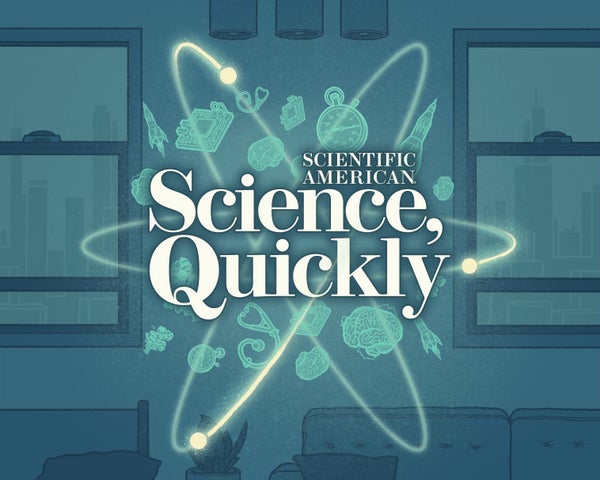[Music]
DelViscio: This is Jeff DelViscio, chief multimedia editor here at Scientific American.
On supporting science journalism
If you're enjoying this article, consider supporting our award-winning journalism by subscribing. By purchasing a subscription you are helping to ensure the future of impactful stories about the discoveries and ideas shaping our world today.
Bose: And this is Tulika Bose, senior multimedia editor.
DelViscio: Hey Tulika. Do you remember the year 2006?
Bose: Sure, Jeff. A lot happened.
DelViscio: The existence of Dark matter was confirmed. The missing link between fish and stuff with four legs–a fossil of a creature dubbed Tiktaalik–was found. Twitter launched. But Pluto also lost its planetary status.
Bose: Aww, poor dwarf planet Pluto. And we lost “Crocodile Hunter” Steve Irwin.
DelViscio: A moment of silence.
DelViscio: And everyone believed that drinking wine would help you live longer. Do you remember ... res, res ...
Bose: Oh yeah, resvere ... resvere ...
DelViscio and Bose: Resveratrol.
DelViscio: Right ....
Bose: Yeah ... and everyone also believed that our newly-launched podcast, 60-Second Science, would stay 60 seconds.
DelViscio: [Laughs]
Bose: [Laughs] But over those 15+ years and thousands of episodes of our beloved science podcast later …
DelViscio: ... it became very clear that 60-Second Science …
Bose: …wasn’t actually going to stay 60 seconds. And of those 3,000 episodes, how many were actually 60 seconds?
DelViscio: You know I'm not sure, but I think we started to slide in the mid-2010’s.
Bose: Yeah, that’s the number one piece of feedback I get from everyone who listens to the show and loves it. Your show isn’t 60 seconds! It’s a lie! Including someone who's going to write for us who listened to it on their school bus.
DelViscio: Well, in their honor, we’re not going to live the lie anymore.
Bose: No more, no more. So, because of that we’re going to be correcting the serial error in a big way.
DelViscio: It's a new era in Scientific American podcast history.
Bose: Einstein might have written for us back in the 1950’s ...
DelViscio: ... but you don’t have to be an Einstein to listen to this podcast. It’s a science pod for everyone.
Bose: We’ll be expanding our hosts, our coverage, and most importantly, the space time continuum of this podcast.
DelViscio: Here’s a little taste of the stories–from their new hosts—we have coming ....
Hamilton Morris: Hi, I'm Hamilton Morris, and I'll be talking about chemistry, pharmacology and new research on psycho-active drugs for Scientific American's Science, Quickly.
Shayla Love: Hey, this is Shayla Love and I'm going to take you inside the brain, in love.
[Music]
Christopher Intagliata: This is Christopher Intagliata and I'm searching for the pools of life.
[Music]
Allison Parshall: I'm Allison Parshall and I'm going to be taking you to a world where AI makes music.
[Music]
Jacob Job: This is Jacob Job and together we'll explore bird conservation via nocturnal migration.
[Music]
Kelso Harper: This is Kelso Harper and I'll be exploring the queerness of nature.
[Music]
Jason Drakeford: This is Jason Drakeford and together we'll track down the sounds of outer space.
[Music]
Meghan McDonough: This is Meghan McDonough and I'll be exploring the science of pleasure.
[Music]
Shannon Liao: My name is Shannon Liao and I'll be covering the science of video games and everything you might want to know about that.
[Music]
Tanya Lewis: This is Tanya Lewis.
Josh Fischman: And Josh Fischman, and we'll be back with Your Health, Quickly.
Lewis: Health news you can use on COVID ...
Fischman: ... but now also on stuff beyond the pandemic.
Lewis: Medicine.
Fischman: Neuroscience.
Lewis: Nutrition.
Fischman: Exercise.
Lewis: And a whole lot more.
[Music]
Bose: This sounds fascinating.
DelViscio: And not one of these podcasts is 60 seconds.
Bose: Oh thank God. But we’re still going to respect your time. Fascinating and fast.
DelViscio: You might even say, “Science, Quickly .... ”
Bose: You know what? That’s great. Let’s go with that.
DelViscio: So join us ...
Bose: ... for Science, Quickly.
DelViscio: Coming to this podcast feed ...
Bose: ... this brand new, refreshed podcast feed ...
DelViscio: ... yes, indeed, Monday February 13.
Bose: I preferred Tuesday.
DelViscio: Heartbreaking, I know.
Bose: But Monday it is. I’m not superstitious, I swear.
DelViscio: See you all then.
[Music]
The Science, Quickly music was composed by Dominic Smith.
[The above is a transcript of this podcast.]

